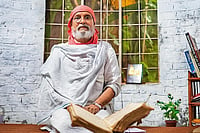The Global Interfaith WASH Alliance (GIWA) is the first initiative to bring together faith leaders to promote sustainable Water, Sanitation & Hygiene (WASH). GIWA’s goal of improving the sanitation value chain, in partnership with Reckitt, led to the establishment of World Toilet College at Rishikesh-based Parmarth Niketan Ashram. Swami Chidanand Saraswati and Sadhvi Bhagawati Saraswati, top representatives of GIWA, talk about these issues with Naina Gautam
How did the idea to set up GIWA happen?
Sadhvi: We have worked for peace, Pujya Swamiji is a part of the international interfaith movement for decades. We realised that across the world more people suffer and die due to a lack of clean water, sanitation and hygiene, compared to violence due to terrorism, domestic issues, or drug-induced crime. This is the inspiration to form an alliance of different faith leaders dedicated to clean water because diseases like diarrhoea and cholera do not discriminate. Of course, sanitation and hygiene are inextricably linked to clean water. GIWA was founded in September 2013 in New York.
What are GIWA’s major achievements till now?
Sadhvi: When we started, 1,600 children under 5 were dying daily due to open defecation in India. About 600 million people were defecating openly. We started a primary campaign to end it. Pujya Swamiji’s movement, ‘Worship to Wash’, was a fantastic success. We were able to convince people to use toilets constructed under Swachh Bharat Abhiyan for the intended purpose, instead of storing grains. We played a role to help people understand the importance of using toilets. We opened conversation on menstruation because there was a lack of education. We started a campaign in Kumbh Mela 2019. We got different religious leaders together to end the taboo around menstruation. Many leaders from both genders, like Pujya Swami Ji and Swami Ramdev Ji, came together on stage to echo the message. Another campaign, ‘Pehle Shiksha, Phir Shaadi’ (First Education, Then Marriage) to end child marriage got us into Guinness World Record.
Swami: In Ujjain, I promoted the concept of ‘From Shivalaya to Shauchalya’ (From temples to toilets). Some did not like the idea initially. Later, they realised the importance of what I was saying.

How is your experience in working with faith leaders?
Swami: Religious leaders have a great impact on followers. If we had talked to followers of other faiths, maybe they would not have listened. We thought if we brought these religious leaders together to teach congregations, everybody would understand the power of clean water and handwashing practices. The Dalai Lama, Pope and other top Muslim, Hindu, Buddhist, Jain and Sikh leaders agreed. When we came together, it was a great message to the world. When faith leaders talked about the issue from scriptures, people saw the point. During Covid-19, we continued to spread the message through webinars, social media and online conferences. We adopted multiple activities. Today, wherever I go, the issue of water comes up. To me, water is the next gold, the next oil. Water is life. Water is future. If water is there, Kumbh is there. We work for clean water. We work for hygiene and sanitation. We work for humanity. We are focused on the 3 Hs of Health, Happiness, and Harmony. We began with health, we connected with happiness, and now it is time to promote harmony across faiths.
How has the global experience helped?
Swami: Knowledge exchange is important. During huge gatherings like Kumbh Mela or Kanwar Yatra, millions turn up. We laid the foundation of a green and clean Kumbh. We brought technology of cleaning water bodies from the Netherlands, and adapted it to India. We utilised learnings from international and national platforms.
Is there particular focus on hand hygiene?
Sadhvi: Earlier, the emphasis was on sanitation and hygiene. You cannot have good hygiene without hand hygiene. For improving the health of masses, especially uneducated people from lower socio-economic status, it is one of the easiest, quickest and most effective ways. We built handwashing stations in schools in Rishikesh and other areas and have also reached gurukuls.
There were also reports of gurukuls and madrasas focusing on hygiene education during Covid-19 with the help of Reckitt. How useful was it?
Sadhvi: It benefited both children and local communities. The partnership with faith leaders strengthened the fight against Covid. The Water Schools Programme ensures that children learn about the importance of protecting water, conservation, personal hygiene and sanitation. Whether it is the use of toilets or proper handwashing, these kids carry the messages to their homes. We are vocal because there is nothing as simple, inexpensive, and powerful to fight diarrhoea, cholera, or other illnesses. In fact, one of the achievements that we have had is the World Toilet College. We train masons. We have a programme, Women for Wash. The trainees from the college act as community leaders.
How important was handwashing in ancient times?
Swami: In Hinduism, the Bhagwad Gita, or Ayurveda, purity and cleanliness were given due importance. These are small tenets in Ayurveda, which are not limited to handwashing but cover cleansing of body, mind and thoughts. The focus is on external and internal purity. The mantras talk about how we can make these concepts an integral part of life. In Vedic times, this was crucial. Hindus use ash or mud to wash hands. Before a Yagya, hands are washed. The Shastras elaborate on such rituals vividly. In Gita, shaucham (purity) is elaborated in Chapter 13 (Mantra 8).
How do you maintain hand hygiene at Kumbh Mela and Kanwar Yatra?
Sadhvi: There are two aspects to it: logistic or practical aspect and awareness creation. On the former, there are handwashing stations and clean drinking water stands. In the Kumbh Mela, even at train stations and bus stands, we put up large LCD screens with public service announcements around the use of toilets, hand hygiene and clean water stations. We had a Toilet Café, and its walls were lined with educational material. Sanitation workers are not sweepers, but soldiers of the society. They need to be recognised as Swachhta Sainiks. In a first episode of its kind, we had saints and sanitation workers bathe and dine together at Kumbh. We distribute cotton bags so that saints take the message to nooks and corners across India. This is the real goal.
Since you have a multi-disciplinary approach, how do you promote eco-friendly handwashing?
Swami: What do you need for an eco-friendly unit? Soap or sanitiser. To spread awareness, we have 100 hand-washing units at water schools. People can make soaps at home. Polluting rivers is a sin. Religion should be innovative in inspiring people to adopt a green lifestyle.
Sadhvi: We are in a precarious situation if solving a problem creates another one. It is important to look holistically at problems and solutions. This is where the eco-friendly solutions help. There are two sides: traditional or eco-friendly soaps. Women self-help groups make such soaps. If we emphasise on these issues, it will encourage the movement to buy local and lead to women empowerment.
How do you see the role of companies in promoting handwashing?
Swami: Companies like Reckitt have helped to spread the message. More companies can join the cause under CSR initiatives. Media has a social responsibility to spread the message. We should work together at different levels, including the individual one.
What does handwashing mean to you?
Swami: Handwashing is not just a process, but a lifesaving activity. We should join hands. People should invest in schools that are located in poor places or slum areas to build handwashing units. Children can then spread the messages to communities and homes.
Sadhvi: People should realise that it is not about handwashing. It is about how in society, everything is interlinked. The Covid pandemic taught us that we cannot be healthy unless everyone is healthy. We cannot be safe unless everyone is safe. What the poor sections do, ranging from open defecation or not washing hands, and getting sick, has a ripple effect that impacts the society. We need to understand and value this interconnectedness. Let everyone give it a thought: Washing hands is fine, and is required, but what else can we do to protect water bodies or uplift lower sections? For example, can we use eco-friendly soaps? It is not just hands or bodies; it’s the impact of health and practices on groundwater, soil, and communities. It’s an opportunity to see how each of us is a thread woven into this karmic tapestry that we share of beautiful nature and beautiful planet.
***
Holy Boost

Father (Dr.) Stephen Mavely
Rector and Vice Chancellor, Don Bosco University, Assam
As a member of a worldwide movement, we have been successful in inculcating some healthy practices in many villages. With increased awareness through social media, government projects and TV channels, people are more receptive to practical suggestions. Such messages from faith-based groups find better acceptance among people. To the Jews, and to much of the great religions that arose from the Middle East, hand hygiene was given a rather exaggerated place. Arising out of the sheer need to wash and purify oneself before entering the house and/or place of worship, these practices were given a religious significance and presented as mandatory observances to maintain religious decorum and purity.
In Christianity, handwashing is often given a religious significance. The priests do it frequently. Sprinkling congregation with water is considered a sign of purification. Water comes into play when a person is baptised (by pouring water and reciting prayers). There are references to handwashing in the Bible. They deal with historic origins (dictated by the need to be clean in a semi-desert and arid land). Exodus 30:17–20 requires priests to wash hands and feet before offering sacrifices or entering the Tabernacle. According to 1 Kings 7:38, Solomon’s Temple contained ten brazen lavers for washing. Biblically speaking, outward cleanliness has no connection to godliness. Jesus made it clear that men are defiled by what is in their hearts, and godliness is not attained by what we eat or don’t eat, or by how often we wash hands. The Pharisees, who questioned Jesus, failed to understand this truth. As Jesus took liberties with the exact observance of these rituals, especially washing of hands and feet, the Pharisees considered him a sinner.
The old Babylonian adage, ‘Cleanliness is next to Godliness’, sounds attractive for these times. The use of sanitizers has to be discontinued, lest we destroy sources of water with huge inflows of additional chemicals. But the habit of handwashing, especially before eating food, will need to stay with us, long after Covid becomes a distant memory.
***
Boddhi-Sattva

Bhikkhu Sanghasena
Founder, Mahabodhi International Meditation Centre
Lord Buddha emphasized cleanliness. I don’t believe cleanliness is next to God, but it is Godliness. In the monastery, we have strict discipline. Without proper washing hands or feet, or without a bath, no one can enter the main shrine. We have rituals for water, which are considered the purest. We offer water to Buddha statues. Water costs nothing. Its nature is such that it cleans everything. So, water is Bodhisattva, which is the Buddha, who gave time and energy to reduce suffering of people. Water does the same; it cleans the ducts of the body or quenches thirst. It is used to clean dirty things, but it is compassionate. It keeps on cleaning. I participate in interfaith programmes. I have worked with faith leaders to promote education, WASH and harmony. When we come together and share knowledge and wisdom, there is a lot to learn from each other. GIWA, for example, has organised huge gatherings. We are happy to create awareness and educate people on the importance of keeping hands clean. Because of Covid, there is more awareness on handwashing. The cleanliness of hands is more important than any other body parts. During Covid, we organised talks on how to protect from it. Through social media platforms, we shared several posters and videos. We ran a campaign, “From Corona to karuna (compassion)”.
In washrooms, we do purification and beautification of the body. In meditation, we do the same thing, purification and beautification of heart, mind and soul. Cleanliness is a reflection of the mind. In Buddhism, everything starts from mind. Everything is conceived and created by it, and slowly manifests in the form of matter. All good and bad things start with hands; therefore, it is important to do handwashing regularly. We have to think and work together to promote hygiene and cleanliness of mind, body and outside environment.

***
Faithful Calls
Dr. Kazim Malik
Scholar and Educationist
Cleanliness is the half of faith.” These are the words of Prophet Mohammed. The Holy Quran mentions purity and hygiene of the body. Surah 5, Ayat 6 says: “Believers! When you rise to [perform] prayers, wash your faces, and your hands (forearms) to the elbows, and wipe over your heads, and wash your feet to the ankles. And if you are in a state of full impurity, then take a full bath”. Surah Nisa in Chapter 4, Ayat 43, says: “O’ believers! Do not approach prayer while intoxicated until you are aware of what you say, nor in a state of full impurity — unless you merely pass through the mosque — until you have bathed”. It is mentioned in Hadith (sayings of Prophet Mohammed) by Hazrat Ayesha (Prophet’s wife) that if he wanted to eat or drink, he would wash his hands.
Washing hands is the foremost aspect of wudu. In Islam, it is mandatory to perform ablution before five times of namaz. Wudu takes care of hygiene of exposed parts of the body. In large gatherings (Eid), people perform wudu at homes and congregate at mosques. Islam emphasises cleanliness and purification of physical, mental and spiritual wellbeing. Handwashing is important, but people should clean their hearts and minds too. Symposia and seminars should be arranged in schools and colleges to sensitise students. Placards should be displayed at railway stations and public places. Children should wash hands each time they go to washroom and before eating.


























